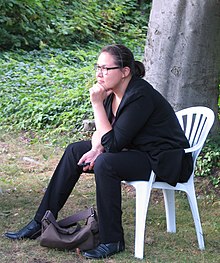Niviaq Korneliussen | |
|---|---|
 Niviaq Korneliussen (2016) | |
| Born | 27 January 1990 Nanortalik, Greenland |
| Occupation | Novelist |
| Language | Greenlandic, Danish |
| Years active | 2013 – Present |
| Notable works | Homo Sapienne (2014) Naasuliardarpi (2020) |
| Notable awards | Nordic Council Literature Prize (2021) |
Niviaq Korneliussen (born 27 January 1990) is a Greenlandic writer, who writes in Greenlandic and Danish. Her 2014 debut novel, Homo Sapienne, was written in Greenlandic, as well as in a Danish translation by the author, with both published by Milik in 2014. Naasuliardarpi (2020) was her follow-up a few years later, and earned her the prestigious Nordic Council Literature Prize.
Biography
[edit]Korneliussen was born in Nanortalik, Greenland.[1] She studied social sciences at the University of Greenland and then psychology at the University of Aarhus, but ended up dropping out of both programs as her writing career launched.[2]
In 2012 she took part in the Allatta! writing project, which encourages young Greenlanders to write literature that reflects their lives. Korneliussen's short story "San Francisco" was one of the 10 Allatta! works published in Greenlandic and Danish in the project's 2013 anthology.[3]
Her 2014 debut novel Homo Sapienne focuses on the lives of five young adults in Nuuk. It was noted for both its use of modern storytelling techniques and for its portrayal of LGBTQ+ people in Greenlandic society.[4] As a lesbian, Korneliussen said it was important for her to write about gay life in Greenland because she had never encountered anything about homosexuality in Greenlandic literature.[5]
Homo Sapienne was nominated for the Nordic Council Literature Prize and the Politiken Literature Award in 2015 and has subsequently been published in English, French,[6] German, Swedish, Norwegian and Romanian.[7]
In 2020, she published Naasuliardarpi in Greenlandic and a Danish translation, Blomsterdalen, ([Flower Valley] Error: {{Langx}}: invalid parameter: |lk= (help)), which won the Nordic Council Literature Prize in 2021.[8] In 2022, Greenlandic Culture Minister Peter P. Olsen presented Korneliussen a cultural award for her writing.[9]
Works
[edit]- "San Francisco"
- published in Inuusuttut — nunatsinni nunarsiarmilu (2013). ISBN 9788792790187
- published in Ung i Grønland — ung i verden (2015). ISBN 9788792790439
- HOMO sapienne (2014). ISBN 9788792790446
- translated into Danish by the author as HOMO sapienne (2014). ISBN 9788792790651
- translated into German by Giannina Spinty-Mossin and Katja Langmaier as Nuuk #ohne Filter (2016) ISBN 9783902902474
- translated into English (Great Britain) by Anna Halager as Crimson (2018). ISBN 9780349010564
- translated into French by Inès Jorgensen as Homo sapienne (2018). ISBN 9782924519585
- translated into Icelandic by Heiðrún Ólafsdóttir as HOMO sapína (2018). ISBN 9789935465924
- translated into Swedish by Jonas Rasmussen as Homo Sapienne (2018). ISBN 9789173437523
- translated into English (USA) by Anna Halager as Last night in Nuuk (2019). ISBN 9780802146748
- translated into Norwegian by Kim Leine as HOMO sapienne (2019). ISBN 9788202572457
- translated into Romanian by Simina Răchițeanu as HOMO sapienne (2020). ISBN 9789734732968
- translated into Polish by Agata Lubowicka as HOMO sapienne (2021). ISBN 9788395348563
- Naasuliardarpi (2020). ISBN 9788793941151
- translated into Danish by the author as Blomsterdalen (2020). ISBN 9788702278385
- translated into Faroese by Vagnur Streymoy as Blómudalurin (2022). ISBN 9789997214621
- translated into Polish by Agata Lubowicka as Dolina Kwiatów (2022). ISBN 9788381915465
- translated into Italian by Francesca Turri as La valle dei fiori (2023). ISBN 9788870916706
- translated into German by Franziska Hüther as Das Tal der Blumen (2023). ISBN 9783442762392
- translated into French by Inès Jorgensen as La vallée des fleurs (2023). ISBN 9782264081131
References
[edit]- ^ "Korneliussen, Niviaq". Inuit Literatures ᐃᓄᐃᑦ ᐊᓪᓚᒍᓯᖏᑦ Littératures inuites. Retrieved 3 June 2021.
- ^ Kembrey, Melanie (26 April 2019). "Niviaq Korneliussen on growing up gay in Greenland and her breakout book". The Sydney Morning Herald. Sydney, New South Wales, Australia. Retrieved 7 April 2020.
- ^ "Allatta! — Let us write!". NAPA/Nordens Institut i Grønland. Retrieved 7 April 2020.
- ^ Gee, Alastair (31 January 2019). "The Young Queer Writer Who Became Greenland's Unlikely Literary Star". The New Yorker. New York City, New York. Retrieved 7 April 2020.
- ^ Scherrebeck, Emil Eggert (15 November 2014). "'Danmark har lært mig mere end at lave brun sovs'" ["Denmark has taught me more than making brown sauce"]. Dagbladet Information (in Danish). Copenhagen, Denmark. Retrieved 7 April 2020.
- ^ "Homo Sapienne". Inuit Literatures ᐃᓄᐃᑦ ᐊᓪᓚᒍᓯᖏᑦ Littératures inuites. Retrieved 3 June 2021.
- ^ "HOMO sapienne". Milik Publishing. Retrieved 7 April 2020.
- ^ "Niviaq Korneliussen wins the 2021 Nordic Council Literature Prize". Nordic Co-operation. 2 November 2021. Retrieved 7 February 2024.
- ^ Veirum, Thomas Munk (21 June 2022). "Korneliussen og Kreutzmann får kulturpriser". Sermitsiaq.AG (in Danish). Retrieved 28 June 2022.